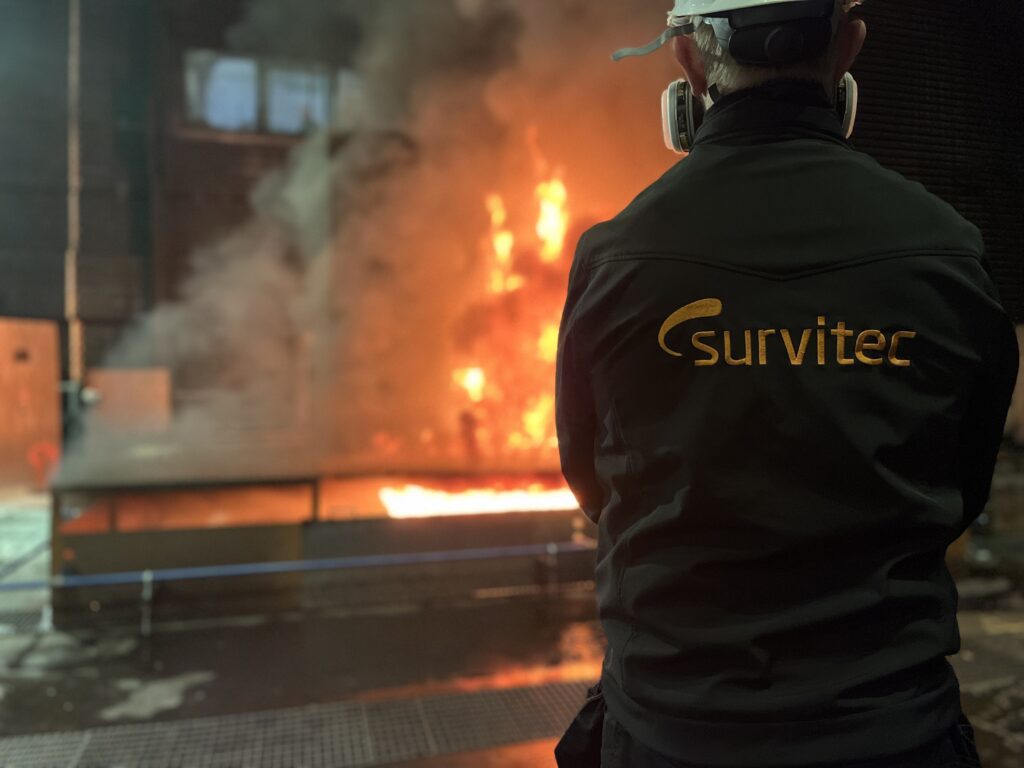A new fire safety study by global Survival Technology solutions provider Survitec has revealed that existing fire-fighting methods used to extinguish machinery space spray and pool fires on conventionally fuelled vessels are inadequate when dealing with methanol-based fires.
This follows extensive comparative fire tests on dual-fuel marine engines using diesel oil (DO) and methanol, carried out amid growing interest in methanol as an alternative marine fuel.
“Our tests confirm that traditional water mist fire suppression mechanisms do not perform as expected on methanol pool fires and methanol spray fires. A completely different approach is required if these ships are to remain safe,” said Michał Sadzyński, Product Manager, Water Mist Systems, Survitec.
Methanol is a methyl alcohol (CH3OH) that burns in a completely different way than hydrocarbon fuels and has a much lower flashpoint of 12°C (54°F). However, while there are established fire safety regulations and testing standards for diesel fuels, clear test protocols for alcohol-based fuels such as methanol and ethanol have yet to be developed.
“We believe this is a high-risk situation that needs immediate action,” stressed Sadzyński. “Methanol fires are far more aggressive than fires involving traditional hydrocarbon fuels. Methanol fires have different physicochemical properties and so they cannot be extinguished as easily or with the same approach.”
The Survitec tests found that while water mist systems are highly effective in absorbing heat and displacing oxygen on diesel fires, they do not produce the same results on methanol fires.
“We had to completely rethink nozzle placement, spacing and other factors to make water mist suppression effective on methanol. For instance, the range for nozzle installation height is much lower than that needed to put out a diesel fire,” he said.
This finding indicates that if existing vessels are retrofitted to run on methanol, they would need to overhaul and redesign their fixed fire-fighting arrangement completely.
For bilge areas, statutory rules formulated in IMO MSC.1/Circ.1621 establish a requirement for an approved alcohol-resistant foam system for ships running on methanol. For the first time, a fixed, low expansion foam system is mandatory under the rules when it comes to protecting machinery space bilges.
“Our tests demonstrate that standard discharge devices do not properly extinguish methanol pool fires in the confined bilge space. It is crucial to deliver properly expanded foam on the methanol pool fire and this is not an easy task within such a narrow space where throw length is limited,” said Maciej Nieścioruk, Product Manager, Foam Systems, Survitec.
He said: “MSC.1/Circ.1621 provides us with a starting guideline but it is very general and therefore open to interpretation. Moreover, methanol compliance for Local Application Firefighting (LAFF) systems is not yet covered. As an industry, we need to come together and develop comprehensive and robust fire test standards and safety rules tailored to methanol’s unique properties.”
The stark conclusion of the investigation arrives at a time of increasing orders for methanol-fuelled ships. The greener fuel is seen as a panacea to meeting the industry’s emissions abatement targets, and forecasts predict accelerated adoption rates.
Orders for methanol-fuelled newbuilds increased by 9% in the last 12 months, 2% more than those for LNG-fuelled ships. Analysts suggest the methanol-fuelled fleet will account for 20mgt by 2028.
“We are seeing a significant uptake in orders for methanol-fuelled vessels, with 2023 being the breakout year for this alternative marine fuel. With more methanol-powered ships being built every year, the industry must act now to prevent dangerous gaps in fire safety,” said Nieścioruk.
“We encourage all stakeholders to come together to address methanol’s unique fire risks and create clear standards, new testing protocols and updated safety rules for methanol.”
[ENDS]

Editors’ notes
- In local areas/engine rooms operating dual-fuel methanol engines, jet or spray fires may occur, requiring Local Application Firefighting (LAFF) systems designed specifically for the localized area around the engine.
- For machinery space bilge areas where methanol fuel leaks may pool, the fire dynamics are different. Bilge fire suppression systems need to be designed to extinguish pool fires rather than jet fires. An alcohol-resistant foam system needs to be used.
- Traditional water mist nozzles used for diesel engine fires do not work as expected on methanol jet fires. New solutions need to be developed and tested specifically for methanol.
- Regulations and standards are still emerging for firefighting systems for methanol-fuelled vessels. More research and testing are needed on appropriate mediums and methods.
- Methanol fires behave differently than traditional diesel fires. Bilge and local fire suppression systems need to be tailored to the unique properties of methanol fires based on ongoing research and testing.
About Survitec
Survitec is a global Survival Technology leader to the maritime, defence & government, aerospace and energy sectors. Survitec has over 3,000 employees worldwide, covering 11 manufacturing facilities and over 400 service centres. They operate in over 2,000 ports, spanning 96 countries. Survitec are the world’s largest manufacturer and supplier of liferaft, Marine Evacuation Systems (MES) and offshore rental PPE. They are a leading supplier of fire solutions to the maritime industry and hold a market leading position for Pilot Flight Equipment in the aerospace & defence market. The Survitec team live by their purpose “We Exist to Protect Lives”. Throughout its 168-year history, Survitec has remained at the forefront of innovation, design and application engineering and is the trusted name when it comes to critical safety and survival solutions. www.survitecgroup.com

